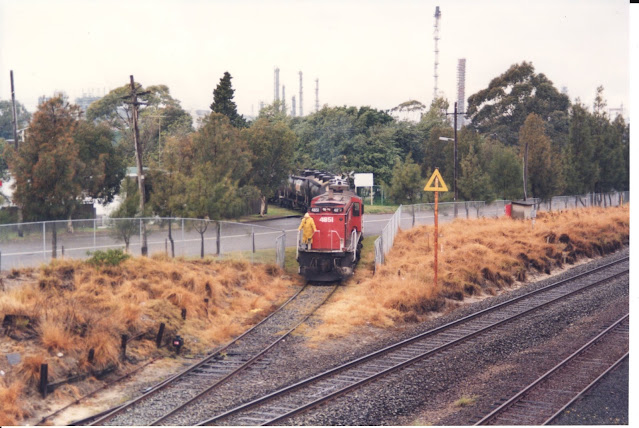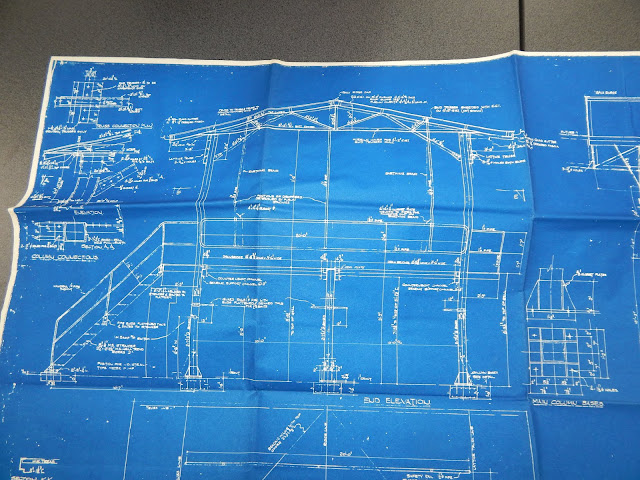Article: Brad Peadon
OPERATIONS
If you have any information/photos of the former AMPOL Terminal at Pagewood, I would very much love to hear from you. Hopefully, we can find enough information to continue this series.

Information about operations in the early days of the line remains elusive, but by the 1990s, it was common practice for the Botany shunter to visit the terminal and push tankers back to the goods yard. Alternatively, trains often operated directly from the terminal to Clyde and beyond.
A 1968 goods train timetable suggests that the terminal was regularly shunted by trip trains, likely those departing Botany. However, this doesn’t rule out shunts by the Botany yard shunter, as such movements wouldn’t typically appear in timetables.
The rolling stock on the line primarily consisted of NTAF fuel tankers serving the terminal. During the steam era, these tankers would have been separated by a match wagon as a safety measure. Occasionally, Kellogg’s NGRX rice hoppers made appearances when their plant was being shunted simultaneously. This raises the possibility of louver vans also being pushed down the branch during Kellogg’s operations, though no concrete evidence of this has surfaced.
Botany also had a shunter’s wagon, which likely became a familiar sight along the branch.
In terms of locomotives, the line has offered remarkable variety, making it a treasure trove for collectors more interested in motive power than rolling stock. The line opened during the steam era, and while I’m far too young to have witnessed those days, I’ve heard firsthand accounts from those fortunate enough to have seen them. The most common locomotives were standard goods engines, including the 50 and 53 classes. A surviving photo shows 3022 in action, and the 59 class is also believed to have been a visitor.
There’s also the tantalizing possibility that the 36, 38, and 60 classes, all frequent visitors to Botany, may have ventured onto the branch, although I’ve yet to uncover definitive proof.
The diesel era provides clearer insights. Over time, the 442, 45, 48, 49, 73, and 82 classes were observed shunting the branch, with several examples documented during the 1990s. Additionally, reports suggest the 44 class occasionally made appearances. This wide range of motive power adds to the line's appeal for enthusiasts and historians alike.
Although there's no concrete evidence to confirm it, it’s quite plausible that an X200 class locomotive operated on the branch during its time as a Botany shunter. The 41 class, which frequently made trips to Botany, and even the Comeng-built 70 class during their brief Sydney stint, could also have traversed the branch. It’s even likely that the 81 class made appearances.
It’s fascinating to speculate what might have been had the line remained operational. The 80 class, moving into trip working, would almost certainly have seen use on the branch. Later, the prospect of Freight Australia locomotives appearing after their entry into NSW fuel train services adds an even more intriguing "what if" scenario.
By the 2000s, with numerous private operators and a diverse array of locomotives, the possibilities for branch operations would have been endless. Imagining this alternate timeline, if the AMPOL/Caltex merger hadn’t occurred, fuel traffic had persisted on rail, and you had your modeling licenses fully up to date - is truly enjoyable.
----------------------------------------------------------------------
Late Additions:
Rod Kelly mentions a firewood company that backed onto the line using the line to bring in NODY (open wagons) wagons of product from the North Coast.
This would then be offloaded over their fence.
This would then be offloaded over their fence.
I would assume that this was down the Ocean Street end of the branch, and may well be the reason for the tarred path and timber crossing that appeared in part 2 of this article.
Roger Renton confirms the use of louver vans, including the huge South Australian ABFX types. He has just scanned a photo of one such movement.
I cannot thank these guys enough for sharing their memories of the branch, and the Botany line in general.
----------------------------------------------------------------------
Photo: Bob Gallagher
48128 and 4837 crossing Baker Street with full tanks from the terminal.
30-4-1996
Photo: Brad Peadon
4908 trundles down the branch as it passes the gates at the Ocen Street end.
Photo: Brad Peadon
----------------------------------------------------------------------
A look at some operations on the line during the last years.
1-6-1991 - 4916 (Candy)
3-12-1991 - 4903 (Candy)
27-12-1991 - 4917 (Original)
8-1-1992 - 4913 4907 (Candy)
28-4-1992 - 48102 (Red Terror)
2-7-1992 - 4908 (Candy)
8-7-1992 - 4897 (Red Terror)
10-7-1992 - 4897 (Red Terror)
14-7-1992 - 4827 (Candy)
Note: Ban on the branch starts sometime during this period.
25-11-1992 - 48100 (Candy) - First train since reopening after glass particle ban.
9-3-1993 - 4917 (Original)
1-5-1993 - 4917 (Original)
1993/94 - 8223 (FR Blue) Only time an 82 noted on the branch.
16-3-1994 - 4902 (Green) - Light Engine
29-4-1994 - 4902 (Green) - 11 in 11 out
30-4-1994 - 4902 (Green)
2-5-1994 - 4917 (Original)
29-1-1996 - 4859 (Candy)
13-2-1996 - 4911 (Original)
26-3-1996 - 4903 (Candy)
27-3-1996 - 44204 44211 (FR Blue)
9-4-1996 - 44204 (FR Blue)
18-4-1996 - 44222 (Candy)
25-4-1996 - 44211 44222 (FR Blue, Candy) - Cab ride to Clyde return.
27-4-1996 - 44212 44215 (Candy, FR Blue) T176
30-4-1996 - 48128 4837 (FR Blue, Red Terror) T220
20-5-1996 - 44212 (Candy) T220
1-7-1996 - 4901 (Green)
4-11-1996 - 44211 (FR Blue)
12-11-1996 - 44215 44204 (FR Blue)
Note: 44204 44209 44215 transferred to Werris Creek 24-11-96
26-11-1996 - 4904 (Original)
27-11-1996 - 4904 (Original)
12-12-1996 - 44222 44212 (Candy)
Note: Branch still saw occasional use into 1997.
8-8-1998 - Half of the line pulled up from near Baker Street down to the Ocean Street gates. Crossings and junction still intact.
An afternoon shunt trip to AMPOL heads back to the junction as it approached Ocean Street.
Photo: Brad Peadon
4916 has just left the Botany line and approaches the Ocean Street crossing. It would head out to the terminal before pulling another rake of loaded tankers.
Photo: Brad Peadon
The newly refurbished terminal is shunted by 44212.
20-5-1996
Photo: Brad Peadon
Junction and Ocean Street crossing as seen from the Page Street bridge.
Photo: Brad Peadon
4859 sitting near the Ocean Street crossing awaiting permission to head on to the mainline.
29-1-1996
Photo: Brad Peadon
4818 doing pretty much the same thing. :-)
Photo: Brad Peadon
One short part of the line fools you into thinking that the line isn't within the busy industrial area it runs through.
This was always a much enjoyed photographic spot.
Photo: Brad Peadon
The terminal shunter that moved the tankers around for loading.
Photo: Brad Peadon
4904 crosses Baker Street after shunting the terminal.
Photo: Brad Peadon
48128 and 4837 waiting at Ocean Street like so many others in the series.
30-4-1996
Photo: Brad Peadon
----------------------------------------------------------------------
Modelling The AMPOL branch.
As can be seen, the branch would make a very easy, and quite cheap, model railway to build and operate.
I asked modeller Bradly Coulter if he could outline the current availability of suitable model locomotives and rolling stock.
Please note, that besides the 442, 45, 48, 49, 73, and 82 class, I've seen no photographic evidence as yet to prove that any other classes have ever actually been used.
40 class - Only done by Eureka N/A, but many have modified American RSC3 models (Frateschi have released these now)
41 class - Were done by Austrains. None are currently available, but occasionally show up 2nd hand.
421 class - done by Austrains, Auscision, planned by SDS Models, but might be worth enquiries with Al about LLoyds kit even if just bodies, as can work out mechs later.
422 class - Auscision did the 422 but like most is not available.
44 class - Trainorama, Auscision both manufacturers have pre-orders available.
442 class - Austrains & Auscision however neither are regularly available,
45 class - AR Kits are the only real option and DCC should be possible, Auscision also did them but they are currently not available.
48 class - Powerline, Trainorama, Auscision (they planned to rerun late 2025).
49 class - Trainorama, and announced by Auscision but the order form is not yet available.
Cooties - The original
70 class - IDR models
73 class - Auscision limited liveries still available but repainting fixes unavailable liveries.
80 class - Austrains, Auscision, SDS Models all presently not available.
81 class - SDS Models
82 class - On Track models
Fuel tanks - SDS Models
Various American brands are available for modifications.
Box/Louvre vans - Powerline, SDS Models, On Track, Auscision.
----------------------------------------------------------------------
Below are a few of the large number of drawings related to the terminal held by the 'Botany Historical Trust' at the 'Westfield Eastgardens' library.
Gatehouse on Moore Street.
Road vehicle Loading Facility.
New concrete bufferstop.
----------------------------------------------------------------------
----------------------------------------------------------------------
While the research continues, this three-part article is complete.
If you have any information/photos of the former AMPOL Terminal at Pagewood, I would very much love to hear from you. Hopefully, we can find enough information to continue this series.
-------------------------------------------------------------

-----------------------------------------------------------------------
Thanks to Bradly Coulter, Bob Gallagher, Rod Kelly, Roger Renton, David Xuereb, and the Botany Historical Trust (Eastgardens Library).
Smithston Design & Graphics
Wikipedia
'The Story Of The Sydenham To Botany Railway' by Neville Pollard.
Check our new Linktree site above for piles of dreary transport entertainment.
-----------------------------------------------------------------------


































No comments:
Post a Comment